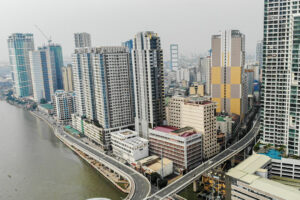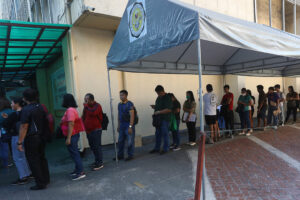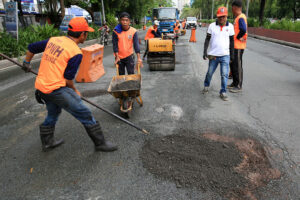By Kyle Aristophere T. Atienza, Reporter
MALACAÑANG on Monday assured that the Philippine government will not operate under a reenacted budget next year.
Presidential Communications Secretary Cesar B. Chavez made the remark following two meetings in which President Ferdinand R. Marcos, Jr. and his Cabinet officials reviewed items under the Congress-approved budget for 2025.
“In the past two meetings that I attended with them, there was never discussion on that (reenacted budget),” he said in a Viber message to reporters.
Mr. Chavez said Mr. Marcos recently met with secretaries of Budget, Finance, National Economic and Development Authority, and Public Works to review the proposed national budget for 2025 for the second time.
“The printed copy of the spending measure was only received late Friday afternoon,” he said.
“President Marcos, Jr. hopes to act on the measure before the year ends.”
The proposed P6.352-trillion national budget, which was ratified by both houses of Congress on Dec. 11, is equivalent to 22.1% of the country’s gross domestic product (GDP), and 10.1% higher than the P5.768-trillion budget this year.
The Presidential Palace on Dec. 18 announced the postponement of the budget signing set for Dec. 20, amid backlash that has forced Mr. Marcos to push for the restoration of cuts from the Department of Education’s (DepEd) budget.
Mr. Marcos has justified the bicameral conference committee’s (bicam) move to remove the state subsidy for the Philippine Health Insurance Corporation (PhilHealth), citing its reserves.
The National Government operated under a reenacted budget in 2019 — the first in eight years — after lawmakers failed to pass the spending plan on time in December 2018.
At that time, the Department of Budget and Management (DBM) issued guidelines telling agencies that they may not spend more than the amount specified in the proposed budget for projects and operations in the first quarter of 2019.
The guidelines also said government agencies can only spend on their workers’ salaries based on the 2018 level until the spending plan is passed, barring any pay hike.
The rules also barred agencies from implementing new projects, saying that only the maintenance and other operating expenses (MOOE) and capital outlay for ongoing foreign-assisted and locally funded projects can be funded under the reenacted budget.
The DBM had warned lawmakers at that time that a reenacted budget could have a GDP growth impact of -1.1 to -2.3% in 2019.
Ser Percival K. Peña-Reyes, director of the Ateneo de Manila University Center for Economic Research and Development, said a reenacted budget next year could lead to “uneven growth because of structural imbalances.”
“There are going to be some negative short-term effects from reenacting a budget, particularly the delay of on-going infrastructure and other social programs,” said Leonardo A. Lanzona, who also teaches economics at the Ateneo.
“This will mean that the government will have to reduce much of its expenditures that can impact on economic growth, perhaps bringing down the growth by at least a third of what is expected,” he added in a Messenger chat.
The Philippine economy in the third quarter grew at the weakest pace in more than a year at 5.2%, due largely to weather disturbances’ impacts on government spending and farm output.
The government earlier this month narrowed its economic growth target for 2024 to 6 to-6.5% from a top end of 7% previously and is targeting a 6-8% GDP target for the whole of 2025.
“The long-term costs of continuing what is obviously a politicized budget are going to be much greater than the short-term costs, and the chance of recovering is even much lower,” Mr. Lanzona said. “Hence, there is no alternative but to swallow the short-term costs and to fix the budget by securing the appropriate priorities into the future.”
“We cannot definitely create a firewall between the political structure and the economic system,” he added. “This episode of economic inefficiency is a result of a political structure where the unfit and the worst people are placed in positions of power.”
CRITICAL SECTORSIn a statement on Monday, the Philippine Economic Society urged the Marcos leadership to restore funding for critical sectors and implement strategic subsidies for the state health insurer, as Cabinet officials identify items to be vetoed in the proposed national budget.
It said the P83-billion budget cut in the proposed budget of the Department of Social Welfare and Development (DSWD) “weakens safety nets for the most vulnerable, including conditional cash transfers, disaster relief, and feeding programs for children.”
“Cuts to school and daycare feeding initiatives will exacerbate hunger and malnutrition,” it added, “impacting children’s health, learning outcomes, and future productivity.”
The government should ensure transparency and targeted social transfers for the needy by eliminating “politicization and discretion” in the management of social transfer funds, it said, citing the DSWD’s Ayuda sa Kapos Ang Kita (AKAP) Program, which is allegedly weaponized by lawmakers.
The group said the National Government should continue to subsidize PhilHealth to fully implement the Universal Health Care (UHC) Act of 2019 and “eliminate reliance on politicized guarantee letters.”
“The P74.47-billion reduction in PhilHealth subsidies jeopardizes the promise of UHC,” it said. “Without strategic subsidies, vulnerable groups, including indigents, persons with disabilities, and senior citizens risk exclusion from healthcare access.”
It also warned that the P11.6-billion cut in DepEd’s budget endangers efforts to address the learning crisis.
“Cuts to teachers training, infrastructure, and upskilling programs will worsen disparities in access to quality education, leaving many children and workers unprepared for the demands of the modern economy,” it added.
It also said the reduction worth P20 billion in the Department of Agriculture’s budget undermines food security and rural livelihoods.
“Lack of funding for irrigation, mechanization, climate-resilient production systems and farmer support programs threatens productivity and raises food prices, disproportionately affecting the poor,” it flagged.
It asked the Marcos administration to invest more in climate-smart agriculture programs.






